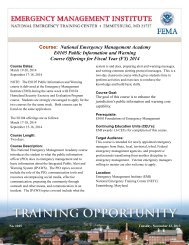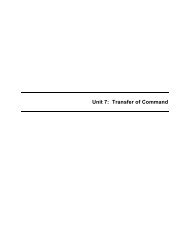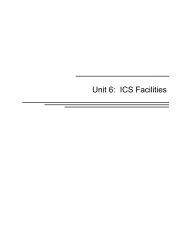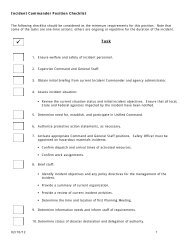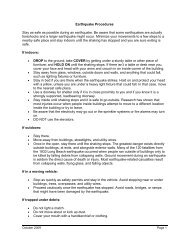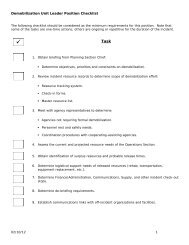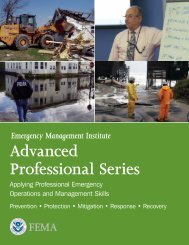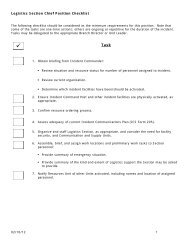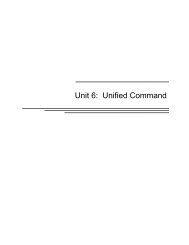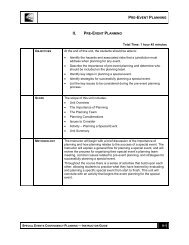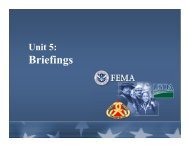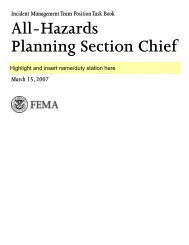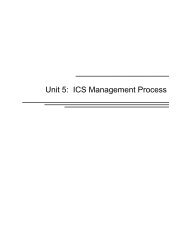EMI Course Catalog - Emergency Management Institute - Federal ...
EMI Course Catalog - Emergency Management Institute - Federal ...
EMI Course Catalog - Emergency Management Institute - Federal ...
Create successful ePaper yourself
Turn your PDF publications into a flip-book with our unique Google optimized e-Paper software.
STATE/LOCAL/TRIBAL FIELD<br />
COURSES—MITIGATION<br />
EmErgEncy managEmEnt InstItutE • 2011-2012 • catalog of coursEs<br />
State/Local/Tribal Field<br />
<strong>Course</strong>s<br />
State/Local/Tribal Field courses are offered by the<br />
State/Local/Tribal training offices. To find out more<br />
information about these courses, please contact your<br />
State Training office (phone numbers and addresses<br />
are listed in this catalog starting on page 186).<br />
Mitigation Curriculum<br />
Mitigation makes sense—and it works. For every<br />
dollar spent on mitigation, at least two are saved in potential<br />
response and recovery costs.<br />
Mitigation means preventing or reducing a disaster’s<br />
effects on life and property through land-use planning,<br />
retrofitting, effective building codes, hazards<br />
identification and risk assessment, and a wide variety<br />
of other activities. Mitigation reduces the impact of<br />
any future disaster; it protects a community on a<br />
long-term basis. A disaster-resistant community is one<br />
where citizens, elected officials, and local businesses<br />
undertake “sustained action that reduces or eliminates<br />
long-term risk to people and property from<br />
hazards and their effects.”<br />
FEMA encourages communities to become disaster<br />
resistant by emphasizing efforts at the local level,<br />
with mitigation goals determined by the community.<br />
The strong partnerships developed between<br />
government, private industry, and the citizens of a<br />
community bring together resources from diverse<br />
sources to address a common goal.<br />
<strong>EMI</strong>’s State/Local/Tribal Field courses provide a way<br />
for many of these partners to attend the training they<br />
need at the State, local, or Tribal level. These courses<br />
are designed for those who make mitigation happen<br />
by making changes at the local level: local officials<br />
and community leaders; architects, engineers, and<br />
building officials; building contractors; educators<br />
and school administrators; and others concerned<br />
with making their community disaster-resistant.<br />
FEdErAL EmErgENCy mANAgEmENT AgENCy 86<br />
Local mitigation leaders also are encouraged to review<br />
<strong>EMI</strong>’s Independent Study curriculum offerings,<br />
described in this catalog beginning on page 148.<br />
Local Floodplain Manager Roles and<br />
Responsibilities (G194 .1)<br />
This course is designed to familiarize participants<br />
with various aspects of the Floodplain Manager’s<br />
job. Four key roles will be examined and discussed:<br />
Regulator, Coordinator, Educator, and Planner. These<br />
roles impact the Floodplain Manager’s job and have<br />
broad-reaching impacts in the community.<br />
Selection Criteria: This course is designed for<br />
Floodplain Managers with at least 2 years of floodplain<br />
management experience or who have the<br />
Certified Floodplain Manager (CFM) credential.<br />
National Flood Insurance Program (NFIP)<br />
Rules and Regulations in Depth (G194 .2)<br />
This course is designed to review Section 60.3 of<br />
Title 44 of the Code of <strong>Federal</strong> Regulations (CFR)<br />
and other rules and regulations that impact floodplain<br />
management. Participants will be led through<br />
discussions and interactive exercises that explore<br />
the details of the interpretations of the various<br />
regulations. Topics covered include: floodway<br />
and encroachment requirements; new residential<br />
building requirements; development in Approximate<br />
A zones; accessory and agricultural buildings;<br />
anchoring fuel storage tanks; regulating recreational<br />
vehicles; environmental and historical regulations;<br />
and typical compliance problems.<br />
Selection Criteria: This course is designed for<br />
Floodplain Managers with at least 2 years of floodplain<br />
management experience or who have the<br />
Certified Floodplain Manager (CFM) credential.



